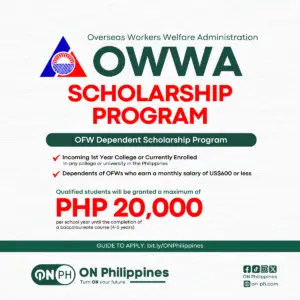The Overseas Workers Welfare Administration (OWWA) is an attached agency of the Department of Labor and Employment (DOLE) and a membership institution. It protects and promotes the welfare of Overseas Filipino Workers (OFWs) and their dependents. It was formerly known as Welfare and Training Fund for Overseas Workers and was organized in 1977.
OWWA offers two scholarship programs: the Education for Development Scholarship Program (EDSP) and the OFW Dependent Scholarship Program (ODSP). These are available to qualified children or siblings of active OWWA members, as long as the siblings are either single or married without children. Also, no other family member should be receiving an OWWA scholarship at the same time.
Education for Development Scholarship Program (EDSP)
The EDSP is a scholarship available to qualified dependents of OFWs, offering up to Php 60,000 per school year until they complete a 4-5 year college degree. For incoming freshmen, scholars are chosen based on their performance in the DOST national exams, with only the top 1,000 qualifiers considered. Additionally, 600 slots are available for students already in their 2nd to 5th year of college, provided they are enrolled in any college or university in the Philippines.
To qualify for the scholarship, applicants must either be the children of active OWWA members or the siblings of active OWWA members who are either single or married without children. Additionally, no other family member of the OFW should be receiving any other OWWA scholarship.
For Incoming 1st Year College
- Single
- Not more than 21 years old
- Grade 12 graduating student
- GWA of 80% or its equivalent
For 2nd to 5th Year College
- Single
- Not more than 30 years old
- With GWA of atleast 85% or its equivalent
- Must have no failing grades
- Must be enrolled in a Philippine-based college/university
- Documentary Requirements
Applicants must submit the following basic requirements when applying online:
- Proof of Identity
- OFW – Valid Passport Copy of OFW Passport Bio or Information Page
- Dependent – School I.D. or any available valid ID
- ANY of the following: Birth Certificate or Baptismal
- Proof of grades from the previous School Year
(i.e. Form 137 or Form 10 [TOR], Form 138 or Report Card, or Certificate of Grades from the School) - Note: If a student’s grades from the previous semester are not available at the time of application, the grades from the last two school years can be used as a reference instead.
OFW Dependent Scholarship Program (ODSP)
ODSP is a scholarship program that provides financial assistance of Php 20,000 per school year to qualified dependents of OFWs who earn a monthly salary of US$600 or less. It is available to those who are planning to enroll, are currently enrolled, or have previously enrolled in any four-year or five-year bachelor’s degree or associate course at a college or university in the Philippines.

To qualify for the scholarship, applicants must either be the children of active OWWA members or the siblings of active OWWA members who are either single or married without children. Additionally, no other family member of the OFW should be receiving any other OWWA scholarship.
For Incoming 1st Year College
- Single
- Not more than 21 years old
- Grade 12 graduating student
- GWA of 80% or its equivalent
For 2nd to 5th Year College
- Single
- Not more than 30 years old
- With GWA of atleast 85% or its equivalent
- Must have no failing grades
- Must be enrolled in a Philippine-based college/university
Documentary Requirements
Applicants must submit the following basic requirements when applying online:
- Proof of Identity
- OFW – Valid Passport Copy of OFW Passport Bio or Information Page
- Dependent – School I.D. or any available valid I.D.
- ANY of the following: Birth Certificate or Baptismal
- Proof of grades from the previous School Year
(i.e. Form 137 or Form 10 [TOR], Form 138 or Report Card, or Certificate of Grades from the School) - Note: If a student’s grades from the previous semester are not available at the time of application, the grades from the last two school years can be used as a reference instead.

